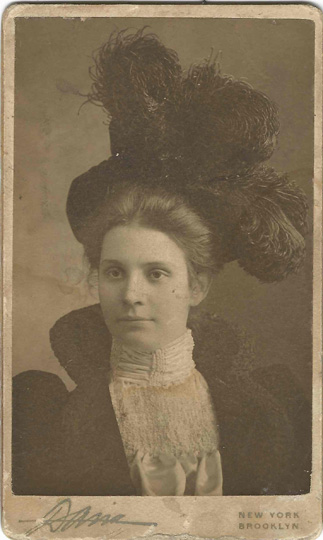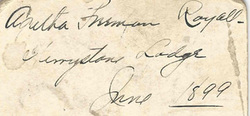The beginning: Agatha Freeman Royall – What is she doing here?
The Turners - Georgia to Acton with a Few Detours One of the projects that Society members have been working on is photographing gravestones in Acton’s cemeteries. Usually, the process of identifying people on the gravestones is straightforward, but sometimes information is scarce. In the case of a cube-shaped marker that said on different sides “Davis,” “Baby,” and “Harriet Turner “ and “John Turner,” more information was needed. Researching Estelle (Turner) Davis’s family for connections to Agatha (Freeman) Royall turned up Harriet Turner and an unexpected story.
Harriet M. Turner, like her sister Estelle (Turner) Davis, was born in Columbus, Georgia. Her death record in Acton showed that she had been a singer and had died in 1939 at age 72. Based on a hypothesis that she might have met Agatha Royall through her singing, online newspapers were searched for any mention of her career. A brief notice of Harriet's death in the Acton Concord Enterprise (March 8, 1939, page 5) said that she had entertained at the White House and for royalty in England and Italy. That surprise opened up many research possibilities. Finally, an article in the Washington Times (June 9, 1922, page 6) gave her life story under the headline “Once Famous Singer is Now Jobless Cook.” According to the article, Harriet and her sister Alice came north to New York with little other than their banjos and their voices. Somehow, sending a letter to complete stranger William Randolph Hearst opened doors for them, and before long, they were performing their “Southern” repertoire for wealthy and well-connected people in the United States and abroad. They performed in London at a party of the Queen that led to more Society appearances in England, and they performed at the White House twice. They toured the continent, making four trips to Europe in all. They sang for dukes, at least one ambassador, Winston Churchill, Mark Twain, and Teddy Roosevelt. In Harriet’s words, “People most socially prominent begged us to sing and play for them. American millionaires sought to buy our entertainment, but we insisted upon being the most exclusive, for that, you see, paid best. We went only to the homes of royalty, nobility, or distinction…we sang and played our merry way along, and we saved never a penny.” Then Harriet evidently became ill, and bills piled up. Her hair turned white, and she was no longer an in-demand, young, Southern woman with a sweet voice and a banjo. Life went downhill. A 1919 Boston Post article (August 8, page 11) revealed that “Miss Harriet Turner... an accomplished musician and vocalist – having entertained Presidents of the United States and Kings and Queens of several European countries – was found sitting in a dazed condition, her clothing drenched with rain, under a tree on the grounds of Boston College…” She was apparently incoherent, suffering from “aphasia.” By the time of the 1922 Washington Times article, she had recovered enough to be working as a cook, though no job seems to have lasted long; the latest mentioned was at the Fort Pond Inn in Ayer (research indicates it may actually have been in Lancaster), working for a woman who had once been her servant. Meanwhile, according to the 1922 article whose source seems to have been Harriet, her sister “Alice” married, “but the man she loved had little money.” Researching Alice Turner yielded no results until an article in the October 15, 1916 Boston Sunday Globe (page 48) revealed that Harriet’s elusive singing partner Alice was actually her sister Estelle Bushnell Turner. The two sisters had evidently been in the North for 12 years, mostly based in Boston, entertaining notable people with songs taken from the South. Estelle was about to marry; the relatively money-less husband that Harriet described was Acton’s own Charles Edmund Davis whom Estelle met in 1915 while trying to buy a summer cottage. Estelle’s listings in the 1930 and 1940 censuses with her husband and mother-in-law show no occupation and no children. Evidently, her sister Harriet came to live with them during her final years, although she died in a Rest Home in Concord. Estelle T. Davis appeared occasionally in local newspaper articles in connection with land ownership and because of an automobile accident in 1943. Her 1961 obituary makes no mention of her singing career; she was described as the widow of well-known realtor Charles Davis. She had been sick for a long period of time. None of this story would have come to light if a portrait of a woman with no apparent connection to Acton had not appeared at the Historical Society. We still don’t know how the picture got here, but the chances are that the singing Turners somehow met Agatha (Freeman) Royall in their performing period. Perhaps their songs reminded Mr. Royall of his Georgia roots. Comments are closed.
|
Acton Historical Society
Discoveries, stories, and a few mysteries from our society's archives. CategoriesAll Acton Town History Arts Business & Industry Family History Items In Collection Military & Veteran Photographs Recreation & Clubs Schools |
Quick Links
|
Open Hours
Jenks Library:
Please contact us for an appointment or to ask your research questions. Hosmer House Museum: Open for special events. |
Contact
|
Copyright © 2024 Acton Historical Society, All Rights Reserved


 RSS Feed
RSS Feed